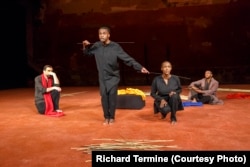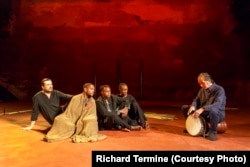Among the world's canon of great stories of war - Virgil's "Aeneid", "Gone with the Wind", "War and Peace" - the longest epic is "The Mahabharata". The 200,000-line Sanskrit poem tells the story of a great war between two sets of cousins for control of the ancient Indian empire. Thirty years ago, director Peter Brook staged "The Mahabharata", in what came to be known as one of the great theater events of the 20th century: a nine-hour long production, with two dozen actors, on a stage covered in dirt, with erupting jets of flame.
Brook started working to bring "The Mahabharata" to the stage towards the end of the Vietnam War. Now, there’s a civil war in Syria, with no end in sight. So, the 91-year-old director decided to re-explore a part of the poem. It starts after a catastrophic war and the play is called "Battlefield".
“We wanted to concentrate on one thing only, which is: not all the causes that lead to a war, not all the horrors of a great massacre, but what is the position of the great leader who realizes that he has done what he set out to do; he has won.”
After his victory, Yudishtira, the prince who’s about to become king, is overwhelmed by the carnage. “This victory is a defeat," he declares. "[The] battlefield is covered by endless heaps of corpses. Golden breastplates and the jewels of the heroes glitter in the sun.” He wants to retreat into the forest to live a life of penance, but Peter Brook says he can't: “You have to live to the responsibility of a person who’s won, which is even greater than the responsibility of a person who has lost.”
So, the prince seeks advice from a deity, asking "The other war, where will it take place? On the battlefield, or in my heart?” And Krishna answers, “I don’t see a real difference. The earth will need you. She will enjoy your victory. She will need you to wake up again, to recover her beauty, her calm, her harmony.”
Epic ideas, writ small
The ideas in "Battlefield" are epic – it looks at death and destiny, the cyclical nature of war and peace. And it does it with just four actors, some different colored shawls, a few sticks, and a drummer. Brook explains, “We’re doing it with a tiny group who are, collectively, one storyteller. And that makes it possible to do what a storyteller can do, which is, both open up an infinitely large cosmos, which a storyteller can do with one word, with one look, with one finger. And, something about the human problems, which a storyteller can find within him or herself.”
Drummer Toshi Tsuchitori tells the story as much as the actors. He sits at the side of the stage, punctuating the observations about war with playing that can be ferocious. Or underscoring a parable about destiny with delicacy.
He says every performance of "Battlefield" is different. He improvises, based on where the show plays – it’s toured all over the world – and the feeling in the room. “Every day I work with actors, one hour’s preparation," he says. "That is my compose.”
The play is only about an hour, but Peter Brook says it’s stuffed with many parables from "The Mahabharata". “The most extraordinary powerful, passionate and great ideas about truth, about life, about death. To make those instantly available to us, through a story, which is touching, comic, human.”
And those are just the kind of stories Peter Brook has been telling audiences for over seventy years.






